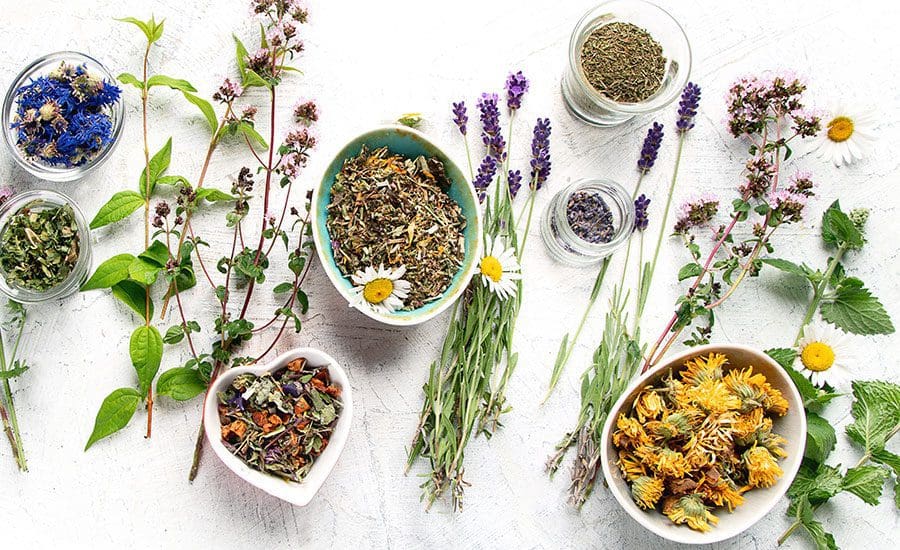
By Victoria Schlabig
Food as medicine

A diet of 80% whole foods does a body good.
Food as medicine is by no means a new concept. The idea derives from 5th century science and Hippocrates, the “founder of medicine,” who reportedly originated the phrase “Let food be thy medicine and medicine be thy food.”
Today, “food as medicine” is more of a way of life for many rather than a temporary addition to your diet.
Food as medicine often focuses on herbs and plants being ingested, whether eaten in food or drink, and there are many sources of information detailing which plants have positive effects on inflammation, immune systems, and levels (cholesterol, blood sugar, etc.).
So, what plants are considered food as medicine? Meredith Cheshire, a herbalist with a degree in medicinal herbs who owns Faeve Plant Therapies in Mount Dora and The Villages, offers her insight into which plants can be used in the kitchen as well as medicinally.
“Many herbs that we can easily attain and grow in Florida have been used in medicine for years,” Meredith says. “Not surprisingly, many herbs are extremely supportive of digestive issues such as garlic, fennel, cayenne pepper, peppermint, rosemary, thyme, and ginger.”
Studies have shown that rosemary and peppermint soothe the nervous system. And there’s solid evidence that herbs help with flatulence, irritable bowel syndrome, balancing of stomach acids and stomach juices, nausea, and vomiting. There is a reason you’re given peppermint candies after a meal at a restaurant – they help aid digestion.
Herbs such as cayenne pepper, ginger root, and turmeric support anti-inflammatory processes, while peppermint, ginger and other herbs reduce fever in human and animals according to studies.
Respiratory disorders, including coughs, colds, and bronchitis, can be helped by garlic, fennel, and thyme. There’s also evidence that thyme is a mild expectorant (a medication that helps bring up mucus and other material from the lungs, bronchi, and trachea).
Dandelion and nettle – both grown in Florida and found in some farmers markets – also offer high medicinal benefits. “Dandelions may be a weed to some, but they are one of the highest sources of potassium of any food we have access to,” Meredith says. Dandelion is a strong diuretic and kidney stimulant that may reduce high blood pressure.
“There is anecdotal evidence that dandelion can be effective for muscular pain as well,” Meredith adds. Dandelions make great tea, and Meredith recommends eating salad made with dandelions and other greens.
Nettle can be found all over Florida, but unfortunately harvesting nettle from the wild can be slightly problematic because of stringers on the tips of the plant’s leaves. “This herb strengthens and supports the whole body,” Meredith says. “Nettle was historically used for internal hemorrhaging, although modern medicine does a better job at that now.” Nettle is most commonly used as a tea, because you don’t have to worry about the stingers when boiling the leaves.
Michelle Williams, owner of Jeff’s Health and Nutrition in Leesburg since January 2020, emphasizes that there are numerous foods that can be used as medicine or to help rid the body of toxins and improve health. Michelle, who has been in the health and fitness industry for over 15 years, focuses on food and nutrition. In fact, she combined nutrition with physical training at one point during her career. She recommends walking the perimeter of your grocery store, where most whole foods can be found.

“One-ingredient foods and whole foods can help your body in so many ways,” Michelle says. “Things like whole leafy greens (spinach, kale, bok choy and so on) are loaded with vitamins and minerals that can help lower cholesterol, reduce blood pressure, and avoid the risk of heart disease,” she says.
The outer edge of the store is typically stocked with fresh produce, meat, fish, milk, eggs, yogurt, and other dairy products, while the center of the store is filled with cans, jars, snacks and processed foods.
Fruits like apples, oranges, and pears are also packed with vitamins to boost immunity. “More than 50% of the American diet is made up of processed foods. That is tragic for the body. The more whole foods we can get the better we will feel,” Michelle says. Eggs are also a super food that provide things like biotin and vitamin D, which can boost immunity.
Many people who don’t get the vitamins and minerals they need just from food should add supplements to their diet. “Every ‘body’ is different,” Michelle says. “Some individuals can’t absorb certain minerals or vitamins like they should and may need to supplement.” That’s why grocery stores carry Vitamins B, B12, E, D, C, and other supplements.
Michelle likes to recommend to everyone that they should be on a great probiotic. “Seventy percent of a person’s immunity starts in their gut. If your gut is not healthy, chances are your body isn’t either,” she says.
Michelle says that shopping in a health food store is important because professionals there can help guide you in the right direction, and answer questions. The best way to find out if you need dietary supplements is by having blood work or talking to your doctor.
“Seventy percent of a person’s immunity starts in their gut. If your gut is not healthy, chances are your body isn’t either.”
—Michelle Williams
Meredith aims to use at least one fresh or dried herb in every meal, and she recommends herbal teas twice a day for certain conditions. “Any time you are evaluating adding an herbal medicine to your everyday life in large quantities, it is always good to get an opinion from either the doctor that prescribed you the medication, your pharmacist, nutritionist, or herbalist,” she says. “Large quantities,” refers to taking supplements or herbs in pill form, not just adding rosemary to your potatoes.
Again, every individual is different and may react differently to a certain food, even some labeled as “healthy.” Of course, processed foods should be avoided as much as possible. Another thing to look for when shopping is GMO labels, as well as produce labels.
An article in the August 2020 issue of Style explains how GMOs affect our bodies. Produce labels tell you where a piece of fruit or vegetable is from, and it is always best to choose a product from as close to home as possible, e.g., choose a tomato from Georgia instead of a tomato from Mexico. The less distance a food travels, the less preservatives it typically contains.
Lastly, stick to a rule of trying to eat clean 80% of the time. Michelle emphasizes that if you fill 80% of your diet with whole, non-processed foods, and avoid sugar, bleached grains, boxed and canned items, you’ll be surprised how much better you feel.
Originally from Buffalo, NY, Victoria graduated from Canisius College in 2018 with a bachelor’s degree in English and Writing. In August of 2019, she relocated to Eustis, Florida, and soon began at Akers Media Group assisting with social media projects. Later that year, she was promoted to a full-time writing position at the company and has since found her niche telling the stories of so many of Lake and Sumter County’s awesome people.































